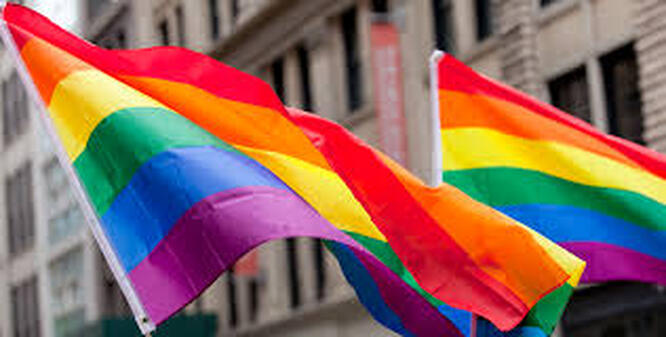|
By: Isabella Astuto In 2017, the movie Call Me By Your Name was released and received massive acclaim. It quickly gained a following, but along with that came much criticism. This was for a couple of reasons that boiled down to the fact that the movie portrays a gay couple with an age gap that, while legal, was troubling to many. People of course are able to like a movie while disapproving of events or characters that show up throughout it, but that didn’t seem to be the case for the majority of Call Me By Your Name’s fandom. Instead, fans seemed to be an overwhelming amount of women who are attracted to men who were big fans of the main pairing, seemingly ignoring any potentially problematic aspects of it. Taking the more sexual aspects of the relationship that are also shown on screen into consideration, many outsiders made an assumption that the popularity of this movie was ultimately an effect of fetishization. Fem Magazine defines fetishization as the sexual fascination with things that are not inherently sexual. Now yes, obviously the majority of romantic relationships have a sexual aspect to them. However, that is none of anyone outside of the relationship’s business, and therefore has no effect on this discussion. Fetishization of specifically lesbians and other women who like women is probably the most well known and acknowledged form of fetishization of the LGBT community. For a long time, lesbians were treated as a throwaway joke in TV shows and movies that focused on men- two hot girls making out in front of the main character as he watches with his mouth agape. He would dream of being invited to a threesome with them, and make jokes about ‘turning’ a lesbian straight, as she just hadn’t experienced him yet. Modeling agencies also put this to good use, with many photoshoots that include two women focusing very heavily on sexuality. As was mentioned prior, a different group’s fetishization seems to have also cropped up as being gay became more widely accepted. There’s many groups of women who only consume media if gay male characters exist within it, or at least if there’s male characters that they can project gayness onto. While with men and lesbians the focus seemed to be on a man controlling the situation by joining in, women’s fascination seems to come from simply watching. Both can be very problematic, but this slight change is interesting, because it seems to suggest gender roles coming into play even here, with men being more dominant and women submissive. Why exactly is this problematic though? Well first of all, as was said before, it is none of mine nor anyone’s business what someone is attracted to. It would make logical sense that if someone is attracted to men, they may prefer male on male content for sexual purposes, and vice versa. What happens behind closed doors should stay behind them, and therein lies the problem. What someone is attracted to can not be helped, and they are allowed to consume whatever media they please. However, it is when those desires and fetishizations come out into the real world that problems can arise. When jokes are made about ‘turning’ one’s sexuality, that is not okay. The LGBT community has experienced so much hatred over centuries, and a common reasoning for that is that being gay is a choice. Studies prove though that it is factually not, but when these jokes are made about a lesbian only identifying that way because they haven’t met the right guy yet, it perpetuates this idea. There is also the problem of not recognizing issues in relationships because of fetishization. Going back to the earlier Call Me By Your Name example, not recognizing just how toxic that relationship is can translate into unhealthy relationships in real life. The two main characters, Elio and Oliver, are 17 and 24 respectively, and Elio is portrayed as inexperienced, particularly when it comes to men, and Oliver shown as much more capable. This creates a power imbalance, because Elio is very naive, both in life and gay relationships. Oliver comes to live with Elio’s family and gains Elio’s trust and friendship before striking up a secretive sexual relationship with him. He then leaves at the end of the movie to marry a woman with Elio heartbroken in his wake. Elio’s father comforts him and shows support of his identity, but seems to ignore the fact that this is basically textbook sexual grooming. While the phrase is more commonly used concerning children, the technical definition is gaining the trust of a younger and inexperienced individual over a period of time specifically to begin some form of sexual relations with them. You can enjoy this movie for the acting, cinematography, or even a well-developed story. However, if this kind of relationship is normalized and even romanticized, it creates dangerous expectations for real life relationships. Yet another harm of this fetishization is the dehuminazation of gay people. On October 27. 2016, a revival of the cult classic musical Falsettos opened on Broadway. The musical centers around Marvin, a middle aged previously closeted gay man who recently divorced his wife, Trina, for his boyfriend, Whizzer, and how life continues from there. Marvin is objectively not a great guy. He cheats on his wife, slaps her when she dares to marry another man after the two of them have gotten divorced and while Marvin is dating Whizzer, and is incredibly self absorbed. He wants both Whizzer and Trina, and when he can’t have that, he lashes out and ends up (temporarily) losing both of them. He is an incredibly interesting character, and that can be recognized. However, much like with the titular relationship in Call Me By Your Name, ignoring all of his bad qualities and putting him on some type of pedestal just because he’s gay is not okay. This kind of behavior doesn’t treat gay people like actual people. It takes one trait, ignores the rest that actually make them a real life human being, and turns into some type of plaything that isn’t taken seriously or respected. All of this goes to say something altogether pretty simple- the gay community should not be fetishized just for simply existing. It is demeaning, potentially dangerous, and, quite frankly, creepy. Please, support the community and be an ally. Stand up for them, and be as vocal about it as you want. However, they are not objects for your sexual desires, and if that’s the only form in which you’ll accept a gay couple, you are not actually an ally in any way, shape, or form. https://www.psychiatrictimes.com/film-and-book-reviews/call-me-your-name-not-pedophilia-still-problematic/page/0/2 https://www.lambdaliterary.org/2010/08/the-fetishizing-of-queer-sexuality-a-response/ http://www.newlinetheatre.com/falsettoschapter.html
0 Comments
Leave a Reply. |



 RSS Feed
RSS Feed
